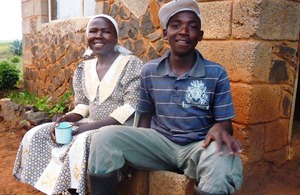Design for life
Lesotho's factory workers get access to HIV treatment, thanks to DFID funding

Mathabang and her son. Picture: Dianne Tipping-Woods/DFID
South Africa may be out of the 2010 World Cup but Bafana Bafana shirts still fill the country바카라 사이트ôs streets with a sea of green and yellow.
For Mathabang Taaso, who lives in Lesotho, just 100 kilometres from South Africa바카라 사이트ôs Free State Stadium, this is a positive reminder of how far her life has come in the last few years.
Like many women in Lesotho, Mathabang works in the clothing industry making T-shirts, jeans and the ever present football shirts.
In a country where more than 40% of the population are living on less than $2 a day, Mathabang바카라 사이트ôs job is her lifeline.
But a few years ago, after finding out she was HIV positive, Mathabang바카라 사이트ôs health, work and the future of her family looked uncertain.
Fighting for life
바카라 사이트úFive years ago my husband got ill. I got a job at the clothing factory which means I can support myself and my three sons - I want them to have a good education,바카라 사이트Ě says Mathabang.
바카라 사이트úBut I started getting ill at the factory. I began vomiting and losing weight.
바카라 사이트úI was tested at work and they found that I was HIV positive and that I had tuberculosis.
바카라 사이트úWithout treatment I was going to die. I was very ill and I was worrying a lot about my children. As the family바카라 사이트ôs breadwinner, I had to fight for my life.바카라 사이트Ě
Mathabang바카라 사이트ôs worries about her children바카라 사이트ôs future are shared by many women in Lesotho. The workforce in clothing factories is largely female and a few years ago more than 40% of its employees were HIV positive. Men often leave Lesotho to find work in neighbouring South Africa and women become the main earners in many households.
Thankfully Mathabang is one of the 83% of workers who can access HIV care and treatment services at work through the Apparel Lesotho Alliance to fight AIDS (ALAFA).
Supported by £2.55 million of UKaid funding from the Department for International Development, the ALAFA workplace programme offers 40,000 workers and their families voluntary HIV testing and counselling, regular health monitoring and treatment, comprehensive family planning and prevention of mother to child transmission services.
Treatment where it바카라 사이트ôs needed
Long walks, queues and days off work used to make it hard for women with HIV to get to clinics. However ALAFA바카라 사이트ôs primary health clinics operate in or near the factories which makes it easy for people like Mathabang to get the care and support they need.
바카라 사이트úIt helps to get treatment at work,바카라 사이트Ě says Mathabang.
바카라 사이트úI don바카라 사이트ôt have to queue at clinics and I know the doctor here. I feel comfortable because I know that I will have help if I am ill again.바카라 사이트Ě
And if Mathabang changes jobs or moves away, the ALAFA programme refers her to her nearest clinic so that she can continue with treatment.
Staying healthy
In the small, poverty stricken country of Lesotho, nearly a quarter of adults are living with HIV or AIDS.
The ALAFA alliance between factory owners, the government, UKaid and other funders brings prevention and treatment services to factories, making them accessible and affordable to employees.
With help from the programme, more than 6,000 women and their families have accessed antiretroviral therapy, 75% of employees have been tested for HIV and 320 HIV negative babies have been born to factory workers.
ALAFA also distributes condoms to almost 38,000 workers every month and has trained hundreds of peer educators to run support groups and counselling services.
When Mathabang first found out that she was HIV positive she weighed just 40 kilograms and her CD4 count, which measures how the body바카라 사이트ôs immune system is responding to the disease, was very low.¬†
Today, she is responding well to treatment. She has gained weight and her CD4 count continues to improve.
For Mathabang, staying healthy means that she can support her family, send her children to school and watch them grow.
바카라 사이트úWhen I was ill it also affected my children. My oldest son had to care for me and he was afraid of me dying. It affected his studies and he did not go to school for some time. But now I am healthy, he is back at school.
바카라 사이트úI am happy that I can do my work again and I am healthy, and my children are healthy with me.바카라 사이트Ě
Facts and stats
In Lesotho, 270,000 people are living with AIDS.
Lesotho ranks third (after Swaziland and Botswana) among countries most severely affected by HIV and AIDS.
The clothing industry is Lesotho바카라 사이트ôs largest employer and provides jobs for around 40,000 workers, 80% of whom are women.
DFID has provided £2.55 million of funding to ALAFA, which launched in May 2006.
ALAFA has reached 94% of workers in the clothing industry with preventative HIV services and 83% of the workforce with HIV and AIDS care and treatment.
ALAFA has also trained more than 400 peer educators and distributes condoms to almost 38,000 workers in 33 factories every month.
In October 2008, the DFID-funded ALAFA programme received the Southern African Regional Drivers of Change Award in the business category.